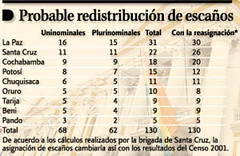Election up in the air?
09.24.2005Technorati tag: Bolivia

![]() Bolivian elections hit a wrinkle on Friday, after the Constitutional Tribunal (the Bolivian fourth branch of government that serves as the constitutional court) decided in favor of using the 2001 census (as the law dictates in Article 60 of the Political Constitution) to assign lower house seat distribution in the December elections. Of course, because the change (since the 1991 census) significantly alters the number of seats, leaders from the regions & movements likely to lose power are challenging the ruling, even threatening not to hold elections unless the previous seat distribution is maintained.
Bolivian elections hit a wrinkle on Friday, after the Constitutional Tribunal (the Bolivian fourth branch of government that serves as the constitutional court) decided in favor of using the 2001 census (as the law dictates in Article 60 of the Political Constitution) to assign lower house seat distribution in the December elections. Of course, because the change (since the 1991 census) significantly alters the number of seats, leaders from the regions & movements likely to lose power are challenging the ruling, even threatening not to hold elections unless the previous seat distribution is maintained.
Under the redistribution, which is population-based, La Paz would lose a seat. The biggest losers are Potosí (3) & Oruro (2). The total loss for Andean highland provinces is 6 (of a 130-member legislature). The winners are Cochabamba (2) & Santa Cruz (4). Tarija, Chuquisaca, Beni, and Pando retain their current distribution. The census reflects an overall trend in population migrations from the highlands to the lowlands. If enforced, candidate lists would have to be altered.
Leaders from MAS (Evo Morales' party) have denounced the change. Along w/ other leftist-populist movements, they've threatened to challenge elections if the seats are redistributed. The head of the Potosí legislative caucus has threatened to prevent parliament from convening to pass any laws altering seat distribution In contrast, Santa Cruz regional leaders are ecstatic. Especially since the ruling was made the day before the 24 de Septiembre departmental celebrations. Several cruceño legislators filed the suit in the constitutional court on 4 August.
The seat distribution, everyone knows, will only hurt Evo; it can't help him. Thus, the opposition is mostly an opposition to electoral hurdles. MAS consistently polls poorly in Santa Cruz, and draws much of its electoral support from Potosí & Oruro. To lose 5 seats there makes the presidency further away. But this is consistent w/ a pattern of refusal by Evo & MAS to accept electoral rules that don't benefit them.
I can empathize w/ Evo's plight. He may be one of the most popular political figures — but he's also one of the least popular. Even if he polls 25% nationwide, most of the remaining votes (at least 60%) would go to candidates diametrically opposed to him (Tuto & Doria Medina). In the political science literature, this makes Evo a "Condorcet loser" (the candidate who would most likely lose in a run-off two-candidate pairing against any other candidates). Sure, Evo could beat Quispe & some of the other leftists — but he can't beat a combination of Tuto & Doria Medina supporters (let alone those voters combined w/ MNR, NFR, and UCS supporters).
MAS has campaigned for the election to ignore Article 90 of the constitution, and give the presidency to the plurality winner since Evo is ahead in the polls. Of course, they opposed this measure when he was in second place (then they proposed a run-off election between the top two candidates, again). Sadly, this demonstrates a weak commitment from MAS to constitutional rules & procedures.
The first lesson of democracy, is that sometimes you lose. You avoid losing by making appeals to a broad range of voters.
Evo has historically refused to negotiate w/ other political figures. This kind of inflexible stubbornness can be a sign of being principled (though I wouldn't call Evo "principled"). But it's a strategy doomed to failure, if the goal is to win the presidency. If Evo every plans to win the presidency, he needs to realize that he will need (and desperately) support from at least one other major political party (perhaps Doria Medina's UN?). But so far he seems absolutely unwilling make those kind of compromises.
In the end, his candidacy will read like the Gabriel García Márquez novel: Cronicle of a Death Foretold.
----
NOTE: The BBC, that paragon of reliable reporting, has a story on the topic that is grossly incorrect. They report that the decision was against using the 2001 census. Clearly, they don't read Bolivian newspapers.
Posted by Miguel at 02:23 PM
Comments
As a Bolivian and Cochabambino I congratulate your reporting on our politics... I am very surprised at BBC.. I always believed, they did a better job than CNN... Bolivia is going through some very hard times.. As a poor country, rampant in corruption etc., abused by the powers, that rule our globe.. we need more understanding of our situation and where it fits into global perspective..Keep it up. Saludos de Cochabamba Tim
Posted by: Tim Johnson at September 26, 2005 12:06 PM